[vc_row][vc_column width=”1/4″][vc_wp_custommenu nav_menu=”31″][/vc_column][vc_column width=”3/4″][vc_tta_tour][vc_tta_section title=”Journal N.10″ tab_id=”1558965211022-e87e2cc9-7165″][vc_column_text]
JOURNAL Nº 10
 The United Nations 2030 Agenda for Sustainable Development is a suitable framework for understanding the integration of all sectors that require the achievement of global sustainability (the well-being of all people and societies). In this context, the need for a holistic view of aspects related to sustainability is revealed, in all social, political and environmental sectors and at all spatial scales. In accordance with this idea, the articles presented in this issue of the magazine are a contribution to the general reflection on the current social and environmental crisis, and an approach to activities in various areas for sustainability.
The United Nations 2030 Agenda for Sustainable Development is a suitable framework for understanding the integration of all sectors that require the achievement of global sustainability (the well-being of all people and societies). In this context, the need for a holistic view of aspects related to sustainability is revealed, in all social, political and environmental sectors and at all spatial scales. In accordance with this idea, the articles presented in this issue of the magazine are a contribution to the general reflection on the current social and environmental crisis, and an approach to activities in various areas for sustainability.
[/vc_column_text][/vc_tta_section][vc_tta_section title=”Journal N.9″ tab_id=”1678276257399-3b0a8663-11af”][vc_column_text]
JOURNAL Nº 9
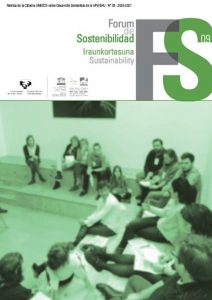 En este nuevo número de la revista Forum se recogen algunas de las aportaciones que se presentaron en el congreso “Construyendo puentes entre la ciencia y la gestión. Investigación para la sostenibilidad en Reservas de la Biosfera” que se celebró en la Reserva de la Biosfera de Urdaibai del 13 al 15 de noviembre de 2019. El objetivo de dicho congreso fue abrir la interlocución entre la investigación y la gestión; es decir, desarrollar un diálogo para que la investigación ayude a las necesidades en la gestión y en el desarrollo sostenible.
En este nuevo número de la revista Forum se recogen algunas de las aportaciones que se presentaron en el congreso “Construyendo puentes entre la ciencia y la gestión. Investigación para la sostenibilidad en Reservas de la Biosfera” que se celebró en la Reserva de la Biosfera de Urdaibai del 13 al 15 de noviembre de 2019. El objetivo de dicho congreso fue abrir la interlocución entre la investigación y la gestión; es decir, desarrollar un diálogo para que la investigación ayude a las necesidades en la gestión y en el desarrollo sostenible.
Dichas aportaciones aparecen en diferentes formatos, pero todas ellas con el mismo objetivo: su aplicabilidad a la gestión.
[/vc_column_text][/vc_tta_section][vc_tta_section title=”Journal N.8″ tab_id=”1594113463718-4d78198f-451d”][vc_column_text]
JOURNAL Nº 8
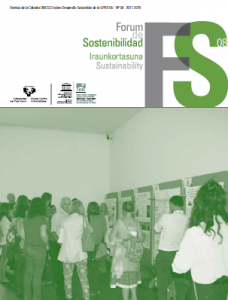 En este nuevo número de la revista Forum de Sostenibilidad se recogen, en formato artículo, algunas de las aportaciones, tanto comunicaciones como pósters, presentadas durante la celebración de las jornadas “Educación, base para los Objetivos de Desarrollo Sostenible” celebradas entre el 5 y 7 de septiembre de 2017 en el Bizkaia Aretoa (Bilbao).
En este nuevo número de la revista Forum de Sostenibilidad se recogen, en formato artículo, algunas de las aportaciones, tanto comunicaciones como pósters, presentadas durante la celebración de las jornadas “Educación, base para los Objetivos de Desarrollo Sostenible” celebradas entre el 5 y 7 de septiembre de 2017 en el Bizkaia Aretoa (Bilbao).
Con estos artículos se suman esfuerzos para contribuir al objetivo previsto en las jornadas de fomentar el intercambio de experiencias y buenas prácticas (en el curriculum, la gestión, la investigación…) encaminadas a la consecución de los Objetivos de Desarrollo Sostenible (ODS) en el ámbito educativo, tanto formal, no formal e informal.
[/vc_column_text][/vc_tta_section][vc_tta_section title=”Journal N.7″ tab_id=”1558965211023-61677015-1714″][vc_column_text]
JOURNAL Nº 7 (2014-2015)
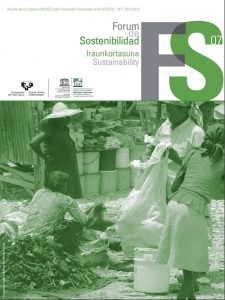
Sustainability Forum journal aims with this number continue to contribute to the knowledge and debate that will allow us to advance further on the roadtowards sustainability.
In this case the subject is focused on the aspect of cooperation and is constructed in the context of the project called Collaboration University-Society for the valorization of ecosystems of the Biosphere Reserve Jaragua-Bahoruco-Enriquillo (Dominican Republic) and La Selle (Haiti) to improve the quality of life of the local population.
ISSN: 1887-9810
[/vc_column_text][/vc_tta_section][vc_tta_section title=”Journal N.6″ tab_id=”1558965221274-5091ed59-dfd1″][vc_column_text]
JOURNAL Nº 6 (2012-2013)
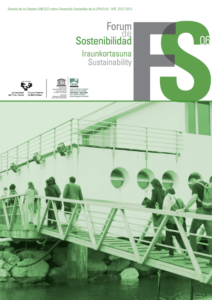
Following the 5th number (2011-2012) of the journal FORUM Sustainability,this edition brings together some of the work of Latin American region,exposed under the I International Congress “The paths of sustainability / sustainability“ held in Bilbao in June 2011.
From Argentina to Mexico, among other countries, experiences, projects and activities in the field of sustainability are presented.
ISSN: 1887-9810
[/vc_column_text][/vc_tta_section][vc_tta_section title=”Journal N.5″ tab_id=”1558965222593-a2b97ba8-b6b4″][vc_column_text]
JOURNAL Nº 5 (2011-2012)
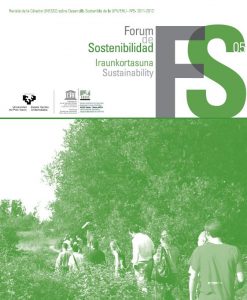
This issue of FORUM Sustainability includes some of the national paperspresented during the celebration of the I International Congress “The paths of sustainability / sustainability” (Bilbao, June 2011) as a further means to disseminate the experience and cases there exposed.
In addition to this number, at Nº 6 they have been published presentations ofrepresentatives of Latin America.
ISSN: 1887-9810
[/vc_column_text][/vc_tta_section][vc_tta_section title=”Journal N.4″ tab_id=”1558965223314-28295066-3ab2″][vc_column_text]
JOURNAL Nº 4 (2010)
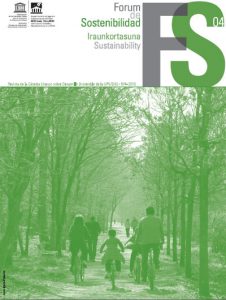
Within the general theme of Sustainable Development, this issue focusesmainly on the analysis of the relationship between human welfare and ecosystems under the conceptual framework of the Millennium Ecosystem Assessment.
The various papers presented show the results of studies carried out from different angles and in different regions around the functions and services of ecosystems, highlighting their contribution to human welfare.
ISSN: 1887-9810
[/vc_column_text][/vc_tta_section][vc_tta_section title=”Journal N.3″ tab_id=”1558965223929-d876bfd0-d943″][vc_column_text]
JOURNAL Nº 3 (2009)
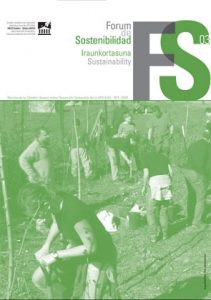
Within the general theme of Sustainable Development, this issue focuses primarily on participation and environmental education.
The “analysis“ includes theoretical or opinion articles on this topic. The “items“ consists of works that describe and analyze the results of specific investigations. Finally, the “opinion“ includes scientific and technical opinions on the proposed topic.
ISSN: 1887-9810
[/vc_column_text][/vc_tta_section][vc_tta_section title=”Journal N.2″ tab_id=”1558965224617-89783863-7ee0″][vc_column_text]
JOURNAL Nº 2 (2008)
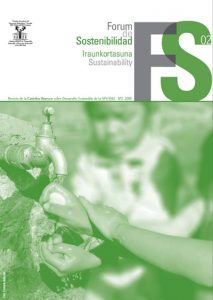
Within the general theme of Sustainable Development, this issue focuses primarily on “water“ on the occasion of the celebration of the Water Decade(2005-2015).
The “analysis“ includes theoretical or opinion articles on this topic. The “items“ consists of works that describe and analyze the results of specific investigations. Finally, the “opinion“ includes scientific and technical opinions on the proposed topic.
ISSN: 1887-9810
[/vc_column_text][/vc_tta_section][vc_tta_section title=”Journal N.1″ tab_id=”1558965225209-12ce7f23-22fb”][vc_column_text]
JOURNAL Nº 1 (2007)
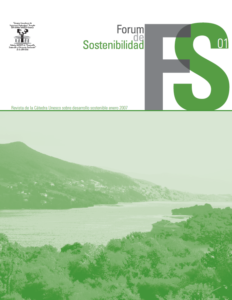
Within the general theme of Sustainable Development, the journal consists of two types of items. The “analysis“ includes theoretical or opinion on a particular theme for each issue of the journal articles. In each issue published the theme selected for the following will be announced.
The “items“ consists of works that describe and analyze the results ofspecific investigations.
ISSN: 1887-9810
[/vc_column_text][/vc_tta_section][vc_tta_section title=”Guidelines” tab_id=”1559042375025-99c2454f-e485″][vc_column_text]
![]() GUIDE FOR AUTHORS (effective as of May 2019)
GUIDE FOR AUTHORS (effective as of May 2019)
The Journal only publishes articles directly pertaining to its subject matter—Sustainability and Sustainable Development Goals (SDGs) and which comply with the guidelines set out below.
FORUM publishes two types of articles:
- Op-ed articles: Includes theoretical papers and opinion pieces regarding sustainability and SDG-related topics.
- Research articles: Includes articles describing and analysing results and/or specific research case studies. Methodologies and objectives must be included and clearly defined.
Acknowledgement of receipt shall only be issued for correctly filed submissions. Should you have any questions, contact the editorial board at: iraunkortasun.katedra@ehu.eus
Only contributors whose work has been assessed and approved by the Editorial Board shall be contacted.
TEXT FORMAT:
All text submissions must be set in Size 12, Calibri font and submitted in .doc format. Clearly indicate which category the article corresponds to—op-ed or research.
- Language: Accepted languages include Euskara, Spanish and English.
- Length: Op-ed articles: Limit to 2,000 words. Research articles: Limit to 4,000 words.
- Titles and contributors: Title of the article; first and last names of the author(s); their affiliation; and the email of the author responsible for reviewing proofs. For example:
| First Name Last Name1,2,*, First Name Last Name2, First Name Last Name3 1Department of Plant Biology and Ecology, University of the Basque Country/Euskal Herriko Unibertsitatea (UPV/EHU). 2UNESCO Chair on Sustainable Development and Environmental Education at UPV/EHU. 3Education Department, Basque Country Government |
- Abstract: Op-ed Articles: Limit to 100 words. Research articles: Limit to 250 words. Alphabetically list 4 to 6 key words and use a semicolon (;) to separate each word. The abstract must be submitted in Euskara, Spanish and English, regardless of the source language of the text.
- Body: Research articles must include the following parts: Introduction; Methodology; Results; Discussion; Conclusion; and References. This is not required for Op-ed articles.
- References: A listing of all the works cited by the author(s) is to be included.
How to cite sources in a text:
|
References are be included at the end of the article and listed in alphabetical order as follows:
| a) Books: Author(s) names(s). Year. Title is typed in italics. Publisher Name, Place of publication. For example: Novo M. 2002. Globalization, Environmental Crisis and Education. Ministry of Education, Culture and Sport. Madrid. b) Articles: Author(s) names(s). Year. Title of the article. Journal name is typed in italics, Volume: Page numbers. For example: Harvell C.D., Mitchell C.E., Ward J.R., Altizer S., Dobson A.P., Ostfeld R.S., Samuel M.D. 2002. Climate warming and Disease Risks for Terrestrial and Marine Biota. Science. 296: 2158-2162. |
When citing publications that have six (6) or more authors, you may use et al.—but it should not be italicized—list the first author name plus et al.
- Figures: Please send electronically to the UNESCO Chair: iraunkortasun.katedra@ehu.eus. Figures must be at least 300 ppi (Pixels per inch) and submitted in JPG, EPS or TIFF formats.
- Figure captions and labelling: Figures shall be labelled with a number such as Figure 1, Figure 2, etc. Be sure to include sufficient contextual information for your viewer to understand the figure, but without this information being duplicated in the text. Figures should not duplicate the same information found in tables and vice versa. When submitting micrographs, the footer must include the caption. It must also be labelled as Fig. 1, Fig. 2, etc.
- Tables: Tables are to be numbered and followed by a clear, descriptive title.
- Include the location of figures and tables in the text.
SEND SUBMISSIONS TO: iraunkortasun.katedra@ehu.eus
ISSN: 1887-9810
[/vc_column_text][/vc_tta_section][/vc_tta_tour][/vc_column][/vc_row]